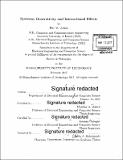Systems, generativity and interactional effects
Author(s)
Adam, Elie M
DownloadFull printable version (19.18Mb)
Other Contributors
Massachusetts Institute of Technology. Department of Electrical Engineering and Computer Science.
Advisor
Munther A. Dahleh and Asuman Ozdaglar.
Terms of use
Metadata
Show full item recordAbstract
The principal concern of the thesis is to understand and uncover interaction-related effects-termed, interactional effects-that arise from the interaction of systems. We may describe the common situation of interest as small entities of systems coming together, interacting, and producing as an aggregate a behavior that would not have occurred without interaction. Those situations are fundamental and appear in countless settings, particularly in settings exhibiting cascade-like intuition. The goal of the research is to show that one can extract from a system the potential it has to generate such effects, and use those extracts to reconstruct, or characterize, the phenomena that emerge upon interaction. In technical terms, we expose cascade-like effects as a loss of exactness, and reveal them as (co)homological intuition waiting to be formalized. We propose a means to relate properties of an interconnected system to its separate component systems in the presence of cascade-like effects. Building on a theory of interconnection reminiscent of the behavioral approach to systems theory, we introduce the notion of generativity, and its byproduct, generative effects. Cascade effects are seen as instances of generative effects. The latter are precisely the instances where properties of interest are not preserved or behave very badly when systems interact. The work overcomes that obstruction. We show how to extract algebraic objects (e.g., vectors spaces) from the systems, that encode their generativity: their potential to generate new phenomena upon interaction. Those objects may then be used to link the properties of the interconnected system to its separate systems. Such a link will be executed through the use of exact sequences from commutative algebra.
Description
Thesis: Ph. D., Massachusetts Institute of Technology, Department of Electrical Engineering and Computer Science, 2017. Cataloged from PDF version of thesis. Includes bibliographical references (pages 285-288).
Date issued
2017Department
Massachusetts Institute of Technology. Department of Electrical Engineering and Computer SciencePublisher
Massachusetts Institute of Technology
Keywords
Electrical Engineering and Computer Science.